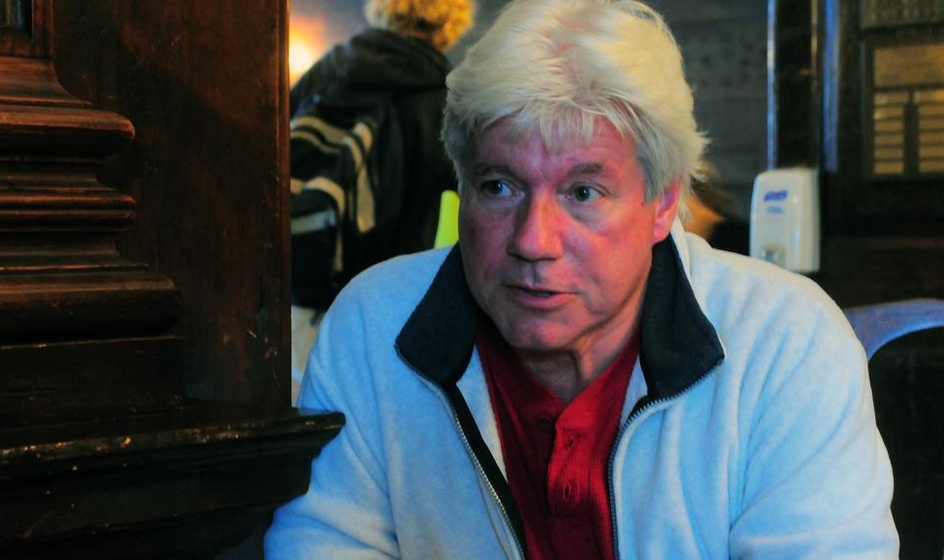As I swing open the door to the Barker Center, Dale R. Riley flashes a smile of recognition and pulls out a bundle of budding yellow roses from behind his back. “I don’t miss appointments,” he says, pushing the flowers towards me and apologizing for not meeting me for lunch during Hurricane Sandy. Clad in a red Henley shirt with shiny white hair, Riley, 63, holds open the door as we exit the building.
Turning left on Quincy Street we join the gaggle of students flocking from the Yard back to the river for Friday lunch. Riley’s never explored the houses before, but he says he hears about places like Pfoho and Adams all the time.
As we saunter through Leverett courtyard Riley shouts out to an administrator he knows and stops to chat. “I knew her since she was an undergrad,” Riley beams. We continue on towards Dunster where we will be dining, and I point out Mather towering to our left. “Mather—oh, this is where those elevators always break down!” he chuckles.
As we pass through the swipe desk, Riley is already talking about all the Barker Center professors he adores. Steven Greenblatt always brings him a Christmas gift, he says, and Jorie Graham once pretended she and Riley were engaged to play a joke on a visiting friend. The leaf blower roaring outside reminds Riley of Professor Bob Orsi who can’t stand the sound of yard work, and Riley marvels at how people like Eugene Rivers go from presenting to the President of the United States to chatting with him in a single day. “It’s interesting guarding them because [the professors] are aware of who they are but they drop all pretense,” he explains.
“When I first came to Harvard,” Riley recalls, “I was reading bad Victorian novels, drinking coffee, and eating Bartley’s burgers every day.” Then Daniel Aaron (the Victor S. Thomas Professor of English and American Literature Emeritus, Riley reminds me) plopped down a copy of “Moby Dick” on Riley’s desk and told him to get to work. “I’m allowed to read at the desk, and I’ve read over 2250 books. I’ve gotten a wonderful education at Harvard,” Riley grins.
As he scoops long-grain white rice onto his fork, Riley explains how he has lived in Middlesex County for his whole life aside from a brief stint as an undergrad at the University of Wisconsin. Estranged from his parents when he dropped out of Wisconsin, Riley spent years attending night classes at Suffolk and the Harvard Extension School while working during the day.
“Security jobs get you thrown in everywhere,” Riley explains. Guarding since 1994, Riley worked at Mass Eye and Ear Infirmary and the Massachusetts Records before coming to Harvard. One night, while on duty, Riley stumbled upon papers proving that both of his parents had died.
At Harvard, Riley’s primary responsibility is the Barker Center, though he occasionally patrols “hotels” which includes many of the science buildings on Oxford Street. He has had more unconventional assignments at Harvard, too. Riley has guarded the Harvard Cylcotron Laboratory and he brought in the new millennium guarding primates in William James Hall.
“This is good food. I could eat here all the time,” Riley remarks, surprised. The red spice chicken fillet has almost disappeared from his tray.
Sipping down the last drizzle of Coca-Cola, Riley explains how he survived mostly on doughnuts and coke while driving a taxi for 20 years. Driving a cab was hard work, Riley remembers: “They’d make you sing for your supper, then they’d throw you to the worms.” But he says the security job at Barker is different. “Whether it’s a laptop missing or a water bottle, I’m the first person they see [in Barker]. But I’m not the show. It’s a blast supporting the students and faculty—it’s relaxing but it’s also a huge challenge.”
Riley asks for my zodiac sign and explains that he’s a Sagittarius (in fact, he tells me that his birthday is the same date as John Lennon’s shooting). He’s an active musician, producing what he calls “background music” that sounds like “north Indian classical music.”
“People don’t like my music except for Professor James Simpson who came out raving about it. I have like a four percent approval rate,” Riley says. He also describes himself as a professional photographer. “I’m self-taught, an autodidact,” Riley remarks, explaining that his ambition upon leaving Harvard is to pursue his music and photography careers. In the meantime, he always keeps a camera in his knapsack.
The wind hits our faces as we wander back up Dewolfe Street towards Barker. We part ways at Grafton Street, and he continues on to Barker while I peel off towards the Harvard Bookstore. Two hours later I receive a text:
“Dear Ginny Thank you for such a wonderful interview It was an honor I will always cherish. Please remember to ‘keep your feet on the ground and keep reaching for the stars...’ Dale Riley.”


